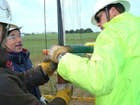Don Broussard, water operations manager for Lafayette, La., Utilities System, testified July 24 at a Congressional hearing on Geologic Carbon Sequestration (GCS) on behalf of the American Water Works Association (AWWA). The hearing was held by the U.S. House of Representatives Energy and Commerce Subcommittee on Environment and Hazardous Materials.
Broussard's testimony raised serious concerns about the potential effect this unproven technology may have on our nation's underground sources of drinking water. GCS is considered one option to prevent carbon emissions from being released into the atmosphere.
"Our overarching concern regarding geologic carbon sequestration is the potential contamination of underground sources of drinking water and other unintended—and possibly harmful—consequences," Broussard said in his testimony. "AWWA is particularly concerned about the potential for contamination of sole source aquifers. These aquifers should be provided with special protective measures."
GCS threatens safe water supplies because contaminants released during the power generation process could be absorbed into previously pristine aquifers during sequestration, rendering them unusable as a drinking water resource. GCS has not yet been proven through study and research, and many experts have raised concerns about the ability to safely contain carbon dioxide once it has been pumped underground.
"Water chemistry in an underground setting is complex," Broussard noted in his testimony. "We need to consider how geologic carbon sequestration could potentially release iron, manganese, arsenic, mercury and possibly other inorganic substances into groundwater surrounding the injection zone."
Other issues raised in the testimony concerned undefined water rights between states sharing a single underground source of water and unresolved long-term liability/financial responsibility for sequestration sites.
AWWA offered several recommendations for Congress to consider, including: avoiding deploying commercial-scale GCS technology until the results of large-scale pilot projects by the U.S. Department of Energy have been reviewed by the agency and the U.S. Environmental Protection Agency; studying and using renewable/non-greenhouse gas producing power generation sources; improving and supporting water and energy conservation and efficiency programs; and studying alternative geoengineering approaches to carbon dioxide destruction or immobilization.
Source: PR Newswire via COMTEX


